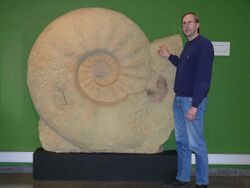Biology:Parapuzosia seppenradensis
| Parapuzosia seppenradensis Temporal range: Lower Campanian
| |
|---|---|

| |
| Scientific classification | |
| Domain: | Eukaryota |
| Kingdom: | Animalia |
| Phylum: | Mollusca |
| Class: | Cephalopoda |
| Subclass: | †Ammonoidea |
| Order: | †Ammonitida |
| Family: | †Desmoceratidae |
| Genus: | †Parapuzosia |
| Species: | †P. seppenradensis
|
| Binomial name | |
| †Parapuzosia seppenradensis (Landois, 1895)
| |
| Synonyms | |
| |
Parapuzosia seppenradensis is the largest known species of ammonite.[1] It lived during the Lower Campanian Epoch of the Late Cretaceous period, in marine environments in what is now Westphalia, Germany . A specimen, found in Seppenrade near Lüdinghausen, Germany in 1895 measures 1.8 m (5.9 ft) in diameter, although the living chamber is incomplete.
The original fossil is shown in the foyer of the Westphalian Museum of Natural History, Münster, Germany. It was once estimated that, if complete, this specimen would have had a diameter of approximately 2.55 m (8.4 ft)[2] or even 3.5 m (11 ft).[3] However, a study in 2021 estimated the diameter of the largest specimens to be around 2 m (6.6 ft).[4] The total live mass has been estimated at 1,455 kg (3,208 lb), of which the shell would constitute 705 kg (1,554 lb).[3]
See also
References
- ↑ Payne, J.L., A.G. Boyer, J.H. Brown, S. Finnegan, M. Kowalewski, R.A. Krause, Jr., S.K. Lyons, C.R. McClain, D.W. McShea, P.M. Novack-Gottshall, F.A. Smith, J.A. Stempien & S.C. Wang 2009. Two-phase increase in the maximum size of life over 3.5 billion years reflects biological innovation and environmental opportunity. PNAS 106(1): 24–27. doi:10.1073/pnas.0806314106
- ↑ (in German) Landois, H. 1895. Die Riesenammoniten von Seppenrade, Pachydiscus Zittel Seppenradensis H. Landois. Jahresbericht des Westfälischen Provinzial-Vereins für Wissenschaft und Kunst 23: 99–108.
- ↑ 3.0 3.1 Teichert, C. & B. Kummel 1960. Size of endoceroid cephalopods. Breviora Museum of Comparative Zoology 128: 1–7.
- ↑ Ifrim, Christina; Stinnesbeck, Wolfgang; González, Arturo H. González; Schorndorf, Nils; Gale, Andrew S. (2021-11-10). "Ontogeny, evolution and palaeogeographic distribution of the world's largest ammonite Parapuzosia (P.) seppenradensis (Landois, 1895)" (in en). PLOS ONE 16 (11): e0258510. doi:10.1371/journal.pone.0258510. ISSN 1932-6203. PMID 34758037.
- (in German) Kennedy, W.J. & U. Kaplan 1995. Parapuzosia (Parapuzosia) seppenradensis (Landois) und die Ammonitenfauna der Dülmener Schichten, unteres Unter-Campan, Westfalen. Geologie und Paläontologie in Westfalen 33: 1–127.
Wikidata ☰ Q291703 entry
 |

